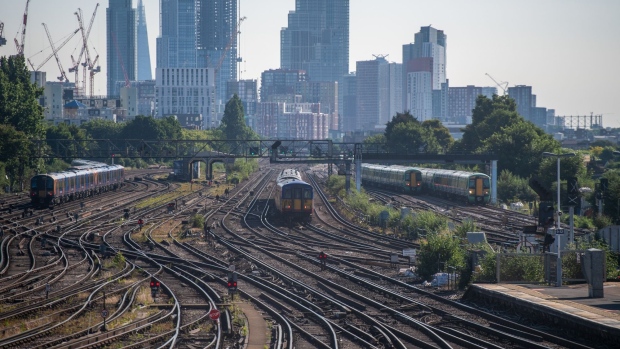Jun 19, 2022
UK Braces for Travel Chaos From Biggest Rail Strike in Decades
, Bloomberg News

(Bloomberg) --
The UK is on course for the worst disruption to mass transit since Margaret Thatcher was Prime Minister after efforts to avert a planned rail workers’ strike failed.
Rail travel will be disrupted across the country in three days of strikes starting Tuesday as 40,000 staff at 13 train operating companies and track manager Network Rail hold Britain’s biggest train strike since 1989. Londoners will be further hit by a walkout on the city’s underground network arising from a separate labor dispute.
The strikes will provide another blow to the U.K. economy at a time when soaring consumer prices are damping confidence and threaten to push the country into recession. The government of Prime Minister Boris Johnson, which hasn’t intervened in the talks, appears to be hoping the strikes will cause a public backlash that could help improve the Conservatives’ sagging poll numbers.
Transport Secretary Grant Shapps said on Sunday the impending chaos, which will see train strikes on June 21, 23 and 25, could have been avoided. He blamed “militant” unions for rebuffing attempts at negotiation and resisting efforts to modernize the country’s rail networks.
‘Self Harm’
“I think it’s a huge act of self harm to go on strike at the moment,” said Shapps in an interview with Sky News. “I don’t believe workers are anywhere near as militant as their unions who are leading them up a garden path: they’re gunning for the strike. It’s completely unnecessary. There’s a sensible pay deal.”
The rail and underground strikes could cost the economy almost 100 million pounds, with London dealt the biggest blow, according to an analysis by the Centre for Economics and Business Research released on June 10. Around 250,000 people will be unable to work on June 21, the first day of action when the mass walkout is set to have the greatest impact, the group said.
The walkouts will come at a time when the industry is struggling to reinvent itself and adapt to a new post-pandemic norm of workers commuting to the office less frequently. Other unions, representing health workers and teachers, are also threatening strikes as an inflation rate of more than 9% erodes real earnings, meaning the unrest may continue into the summer and beyond.
Read More: UK Train Strike Part of Crisis for World’s Oldest Railway
The government supported the railways with £16 billion ($19.5 billion) in state aid during the pandemic without a single employee being fired or furloughed, Shapps said. Rail workers have also seen a 40% increase in pay over the past decade, with median wages for the industry at £44,000, rising to £59,000 for train drivers, which compares with an average of £31,000 for nurses.
“You are being led down a cul de sac by the union leadership, telling you that there is no pay rise,” he said
Mick Lynch, General Secretary of RMT union, paints a different picture: He said the median wage for rail workers is actually £31,000. Lynch also said as many as 5,000 workers have already been forced out of jobs as part of the government-backed modernization talks, most of his workers haven’t had any pay rise in two to three years and rail operators now want to extend the working week from 35 to 40 hours.
“So, they are actually proposing pay cuts, not pay rises, and working longer hours,” said Lynch. “We don’t want to be the cause of disruption in people’s lives. We want a settlement, but we are facing a crisis in our sector.”
Makeover
The shift in travel habits coincides with a wholesale makeover of the railway as the government seeks to simplify fares and scrap a risk and reward-based franchising system. In the future, firms will receive payments to run trains rather than relying partly on less predictable income from passenger fares.
Covid-19 has also upended commuting, with employees working more days from home. Figures released on Thursday reveal the extent of rail’s retreat, with total journeys at only 62% of the pre-pandemic tally in the quarter through March. Most tellingly, season tickets -- the cheapest travel option for daily peak-time commuters -- accounted for just 17% of rail journeys over 12 months, less than half the former level.
“The unions need to understand the world has changed and people don’t need to necessarily travel as they did in the past,” said Shapps. “We want people back at work because the government has been saying we think it’s a better environment, but many people will be able to function from home and the unions don’t seem to realize that people don’t need the products in quite the same way as they once did.”
The rail disruptions are coming just before the start of the peak summer holiday season, with more chaos feared at UK airports. Carriers such as British Airways and EasyJet Plc have canceled hundreds of flights in recent weeks as they suffer from staffing shortages after laying off workers during the pandemic.
Fixing the problem is up to the industry, Shapps said, adding that the government had made it easier for potential workers to get security clearances to speed hiring. He said he was working closely with the airline industry and watching the situation “like a hawk.”
©2022 Bloomberg L.P.


